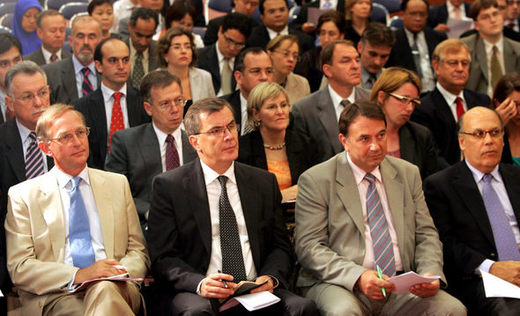 |
|
Foreign diplomats in Seoul listen to a South Korean official explaining the North Korean situation.
|
In this regard, if the Security Council adopts a resolution this time around and the U.S., based on the decision, strengthens its efforts to contain the North, it is apparent what action the North would take. Peace would not be guaranteed any longer on the Korean peninsula, and things could get even worse depending on the level of the U.N. punishment. It should be recalled that under the truce signed after the 1950-53 Korean War, any kind of containment involving the Korean peninsula is prohibited. Among other things, the level of tension will intensify around the demilitarized zone. As shown in the past when such provocative acts took place, the North will intentionally raise security tensions in the area. On October 7, a few days after the announcement that it would go ahead with a nuclear test, five North Korean soldiers crossed the demarcation line. They retreated after South Korea guards fired warning shots. There is no expert who sees North Korea just sit and wait for further sanctions to be imposed. North Korea’s Foreign Ministry issued a statement on October 11 saying that if the U.S. increases "pressure" and "harm" against it, it will continue to take countermeasures and consider the U.S. actions a declaration of war. Against this backdrop, it would represent too high a level of complacency to conclude that the North has played all of its cards. Pyongyang could take the U.N.’s envisioned sanctions as an excuse to conduct additional missile and nuclear tests. The final resort could be the crossing of the line drawn in the sand: the promise that the North would never first use nuclear weapons and would not proliferate.






